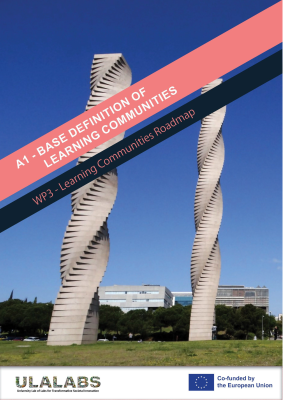A1 Base Definition of Learning Communities: WP3 - Learning Communities Roadmap
Keywords:
Learning Communities, Living Labs, Transformative Learning, Urban TransformationSynopsis
This report discusses the concepts of transformative learning and mutual learning communities leading to an operational conceptualisation and methodology. There is a clear need to move beyond conventional conceptualisations of scaling living lab experiences based on information sharing and knowledge. This report argues that there is a need to focus more on learning. How do we learn to use the results of living lab activities in new context and setting? This report introduces the concepts of Transformational Learning and Mutual Learning Communities from adult and professional learning theories as useful to explore new pathways that can assist in scaling living lab experiences. The focus on learning directs attention to how knowledge and information is processed cognitively and socially in ways in order to apply knowledge and experiences across different contexts.
References
Anderson, B. R. O. (2013). The age of globalization: Anarchists and the anticolonial imagination. Verso.
Byers, T., Imms, W., & Hartnell-Young, E. (2018). Comparative analysis of the impact of traditional versus innovative learning environment on student attitudes and learning outcomes. Studies in Educational Evaluation, 58, 167-177.
https://doi.org/10.1016/j.stueduc.2018.07.003
Dongchao, M. (2014). Toward an Alternative Traveling Theory. Signs: Journal of Women in Culture and Society, 39(3), 584-593.
https://doi.org/10.1086/674323
Erasmus+. (2020). Erasmus+ Programme Guide. European Commission - Directorate General Education & Culture. https://erasmus-plus.ec.europa.eu/sites/default/files/2021-09/erasmus-plus-programme-guide-2020_en.pdf
Joan Batalla-Bejerano, Campo, G. del, Palau, F., Serra, A., Vilariño, F., & Villa-Arrieta, N. (2023). Tr@nsnet Living Lab Model: A Living Lab Model to accelerate the ecological transition (s. 132). Université Toulouse III. https://www.irit.fr/TRANSNET/wp-content/uploads/2023/04/FinalProduct-ULL-Model-Tr@nsnet-Funseam.pdf
Juhola, S., Seppälä, A., & Klein, J. (2020). Participatory experimentation on a climate street. Environmental Policy and Governance, 30(6), 373-384. https://doi.org/10.1002/eet.1900
Kourkoutas, K., Saez, B., Junjan, V., Müller, A. R., Kuipers, W., Palacio, F. H., Lindland, K. M. F., Neset, T.-S., & Malmgren, S. (2024). ECIU Position Paper on Living Labs and Experimentation Spaces: Recommendations and insights about the potential of Living Labs as innovation and learning platforms in the ECIU University. University of Stavanger. https://doi.org/10.31265/USPS.276
Köhler, J., Geels, F. W., Kern, F., Markard, J., Onsongo, E., Wieczorek, A., Alkemade, F., Avelino, F., Bergek, A., Boons, F., Fünfschilling, L., Hess, D., Holtz, G., Hyysalo, S., Jenkins, K., Kivimaa, P., Martiskainen, M., McMeekin, A., Mühlemeier, M. S., … Wells, P. (2019). An agenda for sustainability transitions research: State of the art and future directions. Environmental Innovation and Societal Transitions, 31, 1-32.
https://doi.org/10.1016/j.eist.2019.01.004
Leminen, S. (2013). Coordination and Participation in Living Lab Networks. Technology Innovation Management Review, 3(11), 5-14.
https://doi.org/10.22215/timreview/740
Linnér, B.-O., & Wibeck, V. (2019). Sustainability Transformations: Agents and Drivers across Societies. Cambridge University Press. Mezirow, J. (1991). Transformative dimensions of adult learning. Jossey-Bass. https://doi.org/10.1017/9781108766975
Mezirow, J. (Red.). (2009). Transformative learning in practice: Insights from community, workplace, and higher education. Jossey-Bass.
Pea, R. D. (1994). Seeing What We Build Together: Distributed Multimedia Learning Environments for Transformative Communications. Journal of the Learning Sciences, 3(3), 285-299. Perera, N., & Tang, W.-S. (Red.). (2013). Transforming Asian cities: Intellectual impasse, Asianizing space, and emerging translocalities. Routledge.
Prenger, R., Poortman, C. L., & Handelzalts, A. (2019). The Effects of Networked Professional Learning Communities. Journal of Teacher Education, 70(5), 441-452. https://doi.org/10.1177/0022487117753574
Said, E. W. (1983). Traveling Theory. I The World, the Text, and the Critic (s. 226-247). Harvard University Press.
Scholl, C., De Kraker, J., & Dijk, M. (2022). Enhancing the contribution of urban living labs to sustainability transformations: Towards a meta-lab approach. Urban Transformations, 4(1), 7.
https://doi.org/10.1186/s42854-022-00039-3
https://doi.org/10.1186/s42854-022-00038-4
Sengers, F., Wieczorek, A. J., & Raven, R. (2019). Experimenting for sustainability transitions: A systematic literature review. Technological Forecasting and Social Change, 145, 153-164. https://doi.org/10.1016/j.techfore.2016.08.031
Stoll, L., Bolam, R., McMahon, A., Wallace, M., & Thomas, S. (2006). Professional Learning Communities: A Review of the Literature. Journal of Educational Change, 7(4), 221-258. https://doi.org/10.1007/s10833-006-0001-8
Unger, A., Alcorta De Bronstein, A., & Timoschenko, T. (2023). Transdisciplinary Learning Experiences in an Urban Living Lab: Practical Seminars as Collaboration Format. I J. Halberstadt, A. Alcorta De Bronstein, J. Greyling, & S. Bissett (Red.), Transforming Entrepreneurship Education (s. 137-153). Springer International Publishing. https://doi.org/10.1007/978-3-031-11578-3_8
Wenger, É., McDermott, R. A., & Snyder, W. (2010). Cultivating communities of practice: A guide to managing knowledge (Nachdr.). Harvard Business School Press.
Wilson, B. (1998). Distributed Learning Communicites: An Alternative to Designed Instructional Systems. Annual Research Proceedings of the Association for Educational Communications and Technology, 17. https://www.researchgate.net/profile/Brent-Wilson-6/publication/243771280_Distributed_learning_communities_an_alternative_to_designed_instructional_systems/links/56def55708aec8c022cf33fb/Distributed-learning-communities-an-alternative-to-designed-instructional-systems.pdf
Wilson B., & Ryder, M. (1998). Distributed Learning Communities: An alternative to designed instructional systems, Proceedings of Selected Research and Development


